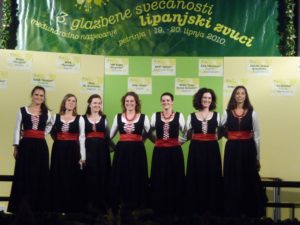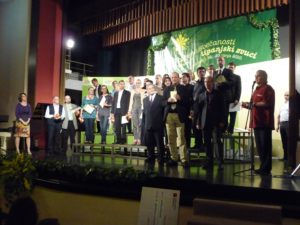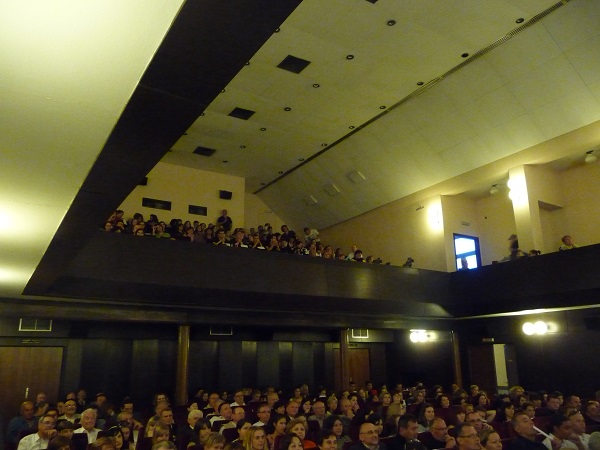Von Andrea Angelini, Herausgeber des ICB
Bei Ankunft in der kleinen Stadt Petrinja wird man vom allumgebenden Duft der alten Lindenbäume willkommen geheißen, obwohl die Juniluft nicht allzu warm ist. Aber die Atmosphäre ist warm, freundlich und festlich durch die Anwesenheit so vieler junger Chöre und so vieler junger, lebendiger und dynamischer Stimmen. Der Internationale Chorwettbewerb “Juniklänge” findet hier in Petrinja, Kroatien, seit drei Jahren statt. Chöre aus Zagreb und vielen anderen kroatischen Städten und aus dem benachbarten Slowenien kamen einer nach dem anderen auf die Bühne in den zwei Wettbewerbsklassen: Klassische Chormusik und Volksmusik für Chöre. Die reiche Auswahl an aufgeführter Musik spiegelt die vielfältigen Landschaften Kroatiens wider, das in Form eines Bumerangs von den Julischen Alpen im Westen bis zur Ebene der alten Region von Pannonia im Nordosten reicht. Ein aufmerksames und mitwirkendes mitgehendes Publikum begrüßte die von der Jury ausgezeichneten Gewinner. Die Jury setzte sich zusammen aus dem Vorsitzenden Branko Stark (Kroatien), Andrea Angelini (Italien) und Bojan Pogrmilović (Kroatien). Der große Preis wurde an das ‘Dišpet’ Ensemble aus Zagreb unter der Leitung von Jurica Bošković verliehen. Derselbe Chor gewann mit der Aufführung des traditionellen Stücks ‘Procvala grana ljiljana’, arrangiert von Joško Ćaleta, auch den Preis der Vereinigung Kroatischer Komponisten für die beste Aufführung eines Stückes von einem kroatischen Komponisten. Die Außentemperatur sank beachtlich mit dem plötzlichen Aufkommen eines starken Sommernebels, aber im Auditorium blieb die Atmosphäre warm und einladend durch das geschäftige Hin und Her der Sänger, die sich auf ihren Bühnenauftritt vorbereiteten oder sich den spontanen Zusammenschlüssen kleiner Grüppchen in den umliegenden Räumen anschlossen.

Verdienter Applaus ging an Snežana Ponoš (Kroatien) und Marjetka Podgoršek Horžen (Slowenien), die als beste Chorleiterinnen ausgezeichnet wurden. Musik geht durch die Zeit, entwickelt sich, experimentiert, ist eng mit einem Ort verbunden, berührt die Gefühle, erzählt von Menschen und Ereignissen und träumt. Komponisten, wie auch Historiker, können ihre eigenen Zeiten erzählen. Der erste Preis des Chorwettbewerbs ging an Bruno Vlahek (Kroatien) für seine Fassung von ‘Laudate Dominum’. Und wenn wir schon vom Schreiben sprechen – Musik schreiben, aber nicht nur Musik – schulden wir Slavoljub Penkala aus Zagreb die Erfindung eines kleinen Gegenstandes, der das Schreiben revolutionieren sollte: den Füllfederhalter. Der brillante Erfinder gründete die erste Fabrik zur Produktion von Füllern im Jahr 1911 und hatte sofort einen enormen Erfolg, der so groß war, dass der Name Penkala Synonym für die Füller wurde, die er produzierte.

Wenn es wahr ist, dass die Umgebung Charakter formt, abgesehen von den jeweiligen persönlichen Neigungen, dann stimmt das ganz besonders für die Musik: vielfältige und sehr unterschiedliche musikalische Erfahrungen haben trotz allem einen gemeinsamen Nenner, der der Charakterausbildung eigen ist. Charakter kann sich schrittweise formen oder durch einen plötzlichen Wirbelwind, wie eine Böe des kalten, trockenen ‘bora’, der in diesem Teil der Welt bekanntlich bis zu 100 km/h erreichen kann. Der ‘bora’ hat auch seine positive Seite, da er die Luft reinigt und auch die Wasseroberfläche klar und durchsichtig macht.
Und zu guter Letzt verdient auch die lokale Küche eine Erwähnung. Kroatien ist ein vielseitiges Land, mit einer großen Vielfalt auch innerhalb einer relativ kleinen Region: vom rauen steinigen Istrien über Slawonien und Baranien, wo es Getreide im Überfluss gibt, zur Küste und den Schätzen, die das Meer bietet. Kurz gesagt, hier gibt es etwas für jedermann!
Für weitere Informationen: www.choralcroatia.com
Email: aangelini@ifcm.net
Aus dem Englischen übersetzt von Christina Kühlewein, Österreich

